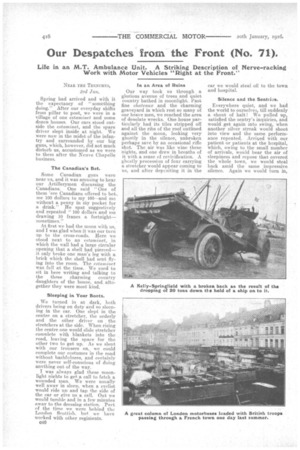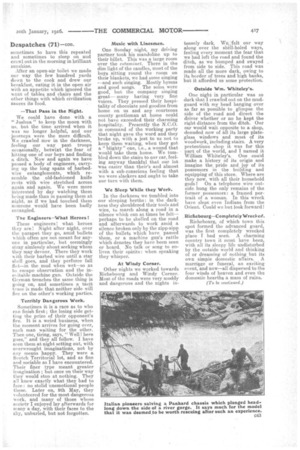Our Despatches from the Front (No. 71).
Page 12

Page 13

If you've noticed an error in this article please click here to report it so we can fix it.
Life in an M.T. Ambulance Unit. A Striking Description of Nerve-Tacking Work with Motor Vehicles "Right at the Front."
NEAR THE TRENCHES, 3rd Jan.
Spring had arrived and with it the expectancy of " something doing." After our everyday shifts from pillar to post, we were in a village of one estaminet and some dozen houses. Our cars stood outside the estaminet, and the spare driver slept inside at night. We were now in the midst of the infantry and surrounded by our big guns, which, however, did not much disturb us, accustomed as we were -to them after the Neuve Chapelle business.
The Canadian's Bet.
Some Canadian guns were near us, and it was amusing to hear our Artillerymen discussing the Canadians. One said "One of them 'ere Canadians offered to bet. me 100 dollars to my 100—and me without a penny in nay pocket for a drink." He spat suggestively and repeated " 100 dollars and me drawing 10 francs a fortnight— sometimes."
At first we had the moon with us, and I was glad when it was our turn up to the cross-roads. Here we stood next to an e8taminet, in which the wall had a large circular opening that a shell had pierced— it only broke one man's leg with a brick which the shell had sent flying into the room. The estaminet was full at the time.. We used to sit in here writing and talking to the three charming country daughters of the house, and, altogether they were most kind.
Sleeping in Your Boots.
We turned in at dark, both drivers being on duty and so sleeping in the car. One slept in the centre on a stretcher, the orderly and the other driver on the stretchers at the side. When rising the centre one would slide stretcher cornnletc with blankets into tho road, leaving the space for the other two to get up. As we slent with our trousers on, we could complete our costumes in the road without bashfulness, and certainly were never self-conscious of doing anything out of the way.
I was always glad these moonlight nights to get a call to fetch a wounded man. We were usually well away in sleet), when a cyclist would ride up and tap the side of the car or give us a call. Out we would tumble and in a few minutes away to the dressing station. Part of the time we were behind the London Scottish, but, we have worked with other regiments.
040 • In an Area of Ruins
Our way took us through a glorious avenue of trees and quiet country bathed in moonlight.. Past fine chateaux and the charming graveyard in which rest so many of our brave men, we reached the area of desolate wrecks. One house particularly had its tiles stripped off and all the ribs of the roof outlined against the moon, looking very ghostly in the silence, unbroken perhaps save by an occasional rifle shot. The air was like wine these nights, and one drew in breaths of it with a sense of revivification. A ghostly procession of four carrying a stretcher would appear coming to us, and after depositing it in the
car we would steal oil to the town and hospital.
Silence and the Senttits.
Everywhere quiet, and we had the world to ourselves, till suddenly a shout of halt! We pulled up, satisfied the sentry's inquiries, and would get again into swing, when another silver streak would shoot into view and the same performance repeated. Arrived with our patient or patients at the hospital, which, owing to the small number of arrivals, would bear the air of sleepiness and repose that covered the whole town, we would steal back amid the same impressive silence. Again we would turn in
Despatches (71)—con.
sometimes to have this repeated and sometimes to sleep on and crawl out in the morning in brilliant sunshine.
After an open-air toilet we made our way the few hundred yards down to the cook and drew our breakfast, eating it in the open air with an appetite which ignored the want of tables and chairs and the other things with which civilization sauces its food.
—That Pass in the Night.
We could have done with a " Joshua" to keep the moon with us, but the time arrived when it was no longer helpful, and our journeys were the more difficult. We crawled now in the darkness, feeling our way past troops occasionally, betwixt the fear of hitting one of our boys and finding a ditch. Now and again we have passed a body of engineers, carrying up the long spans of barbedwire entanglements, which resemble the old-fashioned knife rests with wire stretched across again and again. We were more interested by day watching them i being made than n passing them at night, as if we had touched them someone would have been badly entangled.
The Engineers—What Heroes!
These engineers! what heroes they are ! Night after night, over the parapet they go, amid bullets which often are not meant for anyone in particular, but seemingly stray aimlessly about seeking whom they may devour. There they work 'ivith their barbed wire until a star shell goes and they perforce fall flat—in the mud when wet—so as to escape observation and the in itable machine gun. Outside the German trenches the same thing is going on, and sometimes a tacit truce is made that neither side will fire on the other's working parties.
Terribly Dangerous Work.
Sometimes it is a race as to who can finish first; the losing side getting the prize of their opponent's fire. It is a weird business, when the moment arrives for going over, each man waiting for the other. Then one, tiring, says' "Well! here goes," and they all follow. I have seen them at night setting out, with overwrought imaginations, not by any means happy. They were a Scotch Territorial lot, and as fine and sociable as I have encountered. Their finer type meant greater imagination ; but once on their way they would stop at nothing. They all knew exactly what they had to face: no stolid unemotional people these. Later on, 9th May, they volunteered for the most dangerous -work, and many of those whose society I enjoyed lay afterwards for many a day, with their faces to the sky, unburied, but not forgotten. Music with Linesmen.
One Sunday night, my driving partner took his mandoline up to their billet. This was a large room over the estaminet. There in the dim light of the candles, most of the boys sitting round the room on their blankets, we had some singing —and such singing. Mostly hymns and good songs. The solos were good, but the company singing great — many having very fine voices. They pressed their hospitality of chocolate and goodies from home on us and any courteous county gentleman at home could not have exceeded their charming hospitality. Presently the N.C.O. in command of the working party that night gave the word and they broke up, with a jest to us not to keep them waiting, when they got a " blighty" one, i.e., a wound that would take them home. We tumbled down the stairs to our car, feeling anyway thankful that our lot was easier than their's and almost with a sub-conscious feeling that we were slackers and ought to take our turn with them.
We Sleep While they Work.
In the darkness we tumbled into our sleeping berths : in the darkness they shouldered their tools and wire, to march along a road in a silence which can at times be felt— perhaps to be shelled on the road and afterwards to work amid a silence broken only by the zipp-zipp of the bullets which have passed 'them, or a machine gun's rattle which denotes they have been seen or heard. No talk or song to enliven their spirits : when speaking they whisper.
At Windy Corner.
Other nights we worked towards Richebourg and Windy Corner. Most of the roads were very muddy and dangerous and the nights in tensely dark. We,;felt our way along over the shell-holed ways, feeling every moment the fear that we had left the road and found the ditch, as we bumped and swayed from side to side. This road was made all the more dark, owing to its border of trees and high banks, but it afforded us some protection.
Outside Wm. Whiteley's.
One night in particular was so dark that I crawled out on themudguard with my head hanging over as far as -possible to glimpse the side of the road and direct the driver whether or no he kept the right distance from the ditch, Our car would wait opposite to a shop, denuded now of all its large plateglass windows and most of its woodwork, including stairs. A very pretentious shop it was for this part of the world, and I named it William Whiteley's. One could make a history of its origin and imagine the pride and joy of its possessors in the building and equipping of this store. Where are they now, with all their household gods ? On a telephone wire outside hung the only remains of the former possessors: a framed portrait of a woman. In this wreck have slept even Indians from -the Orient. Could we hut look forward!
Ricfiebourg—Completely Wrecked.
Richebourg, of which town this spot formed the advanced guard, was the first completely wrecked place I had seen. A charming country town it must have been, with all its sleepy life undisturbed by the outside world and thinking of or dreaming of nothing but its own simple domestic affairs. A marriage or funeral, an exciting event, and now—all dispersed to the four winds of heaven and even the domestic hearths a mass of ruins.
(To be continued.)




















